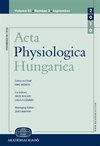Urocortin 2 treatment is protective in excitotoxic retinal degeneration.
引用次数: 8
Abstract
Urocortin 2 (Ucn 2) is a corticotrop releasing factor paralog peptide with many physiological functions and it has widespread distribution. There are some data on the cytoprotective effects of Ucn 2, but less is known about its neuro- and retinoprotective actions. We have previously shown that Ucn 2 is protective in ischemia-induced retinal degeneration. The aim of the present study was to examine the protective potential of Ucn 2 in monosodium-glutamate (MSG)-induced retinal degeneration by routine histology and to investigate cell-type specific effects by immunohistochemistry. Rat pups received MSG applied on postnatal days 1, 5 and 9 and Ucn 2 was injected intravitreally into one eye. Retinas were processed for histology and immunocytochemistry after 3 weeks. Immunolabeling was determined for glial fibrillary acidic protein, vesicular glutamate transporter 1, protein kinase Cα, calbindin, parvalbumin and calretinin. Retinal tissue from animals treated with MSG showed severe degeneration compared to normal retinas, but intravitreal Ucn 2 treatment resulted in a retained retinal structure both at histological and neurochemical levels: distinct inner retinal layers and rescued inner retinal cells (different types of amacrine and rod bipolar cells) could be observed. These findings support the neuroprotective function of Ucn 2 in MSG-induced retinal degeneration.尿皮质素2治疗对兴奋性视网膜变性有保护作用。
尿皮质素2 (ucn2)是一种具有多种生理功能的促肾上腺皮质激素释放因子副肽,分布广泛。关于ucn2的细胞保护作用有一些数据,但对其神经和视网膜保护作用知之甚少。我们之前已经证明ucn2在缺血诱导的视网膜变性中具有保护作用。本研究的目的是通过常规组织学检查ucn2在味精(MSG)诱导的视网膜变性中的保护潜力,并通过免疫组织化学研究细胞类型特异性作用。大鼠幼鼠在出生后第1、5和9天分别接受味精治疗,并在一只眼内玻璃体腔内注射ucn2。3周后进行视网膜组织学和免疫细胞化学处理。免疫标记法检测胶质原纤维酸性蛋白、谷氨酸囊泡转运蛋白1、蛋白激酶Cα、钙结合蛋白、小白蛋白和calretinin。与正常视网膜相比,接受味精治疗的动物视网膜组织出现了严重的变性,但玻璃体内ucn2治疗在组织学和神经化学水平上都保留了视网膜结构:可以观察到明显的视网膜内层和恢复的视网膜内细胞(不同类型的无尖细胞和棒双极细胞)。这些发现支持ucn2在msg诱导的视网膜变性中的神经保护功能。
本文章由计算机程序翻译,如有差异,请以英文原文为准。
求助全文
约1分钟内获得全文
求助全文

 求助内容:
求助内容: 应助结果提醒方式:
应助结果提醒方式:


